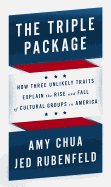
Amy Chua burst into the national spotlight with her unapologetic advocacy of strict parenting techniques in 2011's The Battle Hymn of the Tiger Mother. Now, in The Triple Package, Chua and her husband (and fellow Yale law professor), Jed Rubenfeld, theorize about the personality traits that distinguish successful cultural groups in the United States from the less successful ones, a subject certain to spark controversy.
Three characteristics--a superiority complex, insecurity and impulse control--comprise what Chua and Rubenfeld call, somewhat inartfully, the "Triple Package." When these "distinct forces come together in a group's culture," the pair assert, "they propel that group to disproportionate success." Drawing on what they call a "well-substantiated and relatively uncontroversial body of empirical evidence," reflected in extensive endnotes, they explain in clear and persuasive terms how these at times paradoxical traits have contributed to the undeniably outsized accomplishments of minority groups as disparate as Mormons, Jews and Nigerian immigrants to the U.S.
As impressive a spur to achievement as it may be, Chua and Rubenfeld acknowledge the Triple Package is anything but an unalloyed good. With their relentless focus on "material, conventional, prestige-oriented success," the cultures that value the three traits risk fostering a countervailing set of pathologies, from intolerance to deep neurosis. The authors also take pains to disassociate themselves from those who advance arguments for the inherent superiority or inferiority of any religious, cultural or ethnic group.
If Chua and Rubenfeld succeed in touching off a spirited debate about the best path to that goal, the pair will have accomplished something of real value. --Harvey Freedenberg

